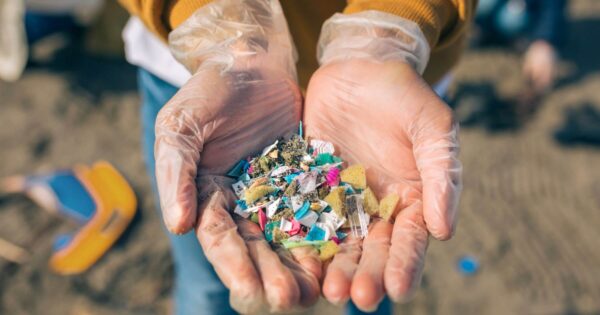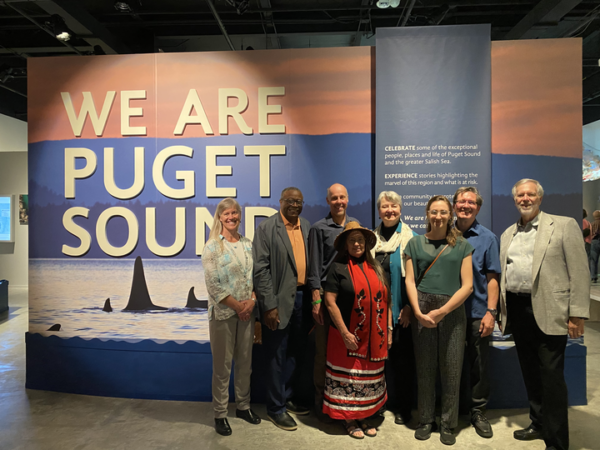Suquamish, WA – Today, the Suquamish Tribe, Puget Soundkeeper, Washington Environmental Council, and the State of Washington announced a settlement with the U.S. Navy over the hull scraping of the ex-Independence, an inactive aircraft carrier that was docked at the Navy’s naval facility in Bremerton. The settlement was filed today in Federal District Court in Tacoma. The lawsuit, initiated three years ago, alleged the scraping was performed without a federal permit and resulted in the release of toxic metals into Sinclair Inlet in violation of the Clean Water Act.
Under the terms of the proposed settlement, the Navy agreed to a ten-year moratorium, during which the Navy will refrain from underwater hull cleaning of the six inactive ships currently located in the Puget Sound. These ships include: ex-Kitty Hawk, ex-Rodney M. Davis, ex-Ingraham, ex-Dubuque, ex-Bridge; and ex-Rainier. The prohibition also extends to any inactive aircraft carriers brought to Puget Sound during that ten-year period. Any further hull scraping must take place in a dry dock where contaminated debris can be contained and safely disposed of.
The Navy also agrees to place a layer of six-to-nine inches of clean sand over eight acres of the sediment floor of Sinclair Inlet to cover the ex-Independence hull scraping debris. This action should reduce further releases of contaminants into the water and help with the recovery of marine life.
The Navy agrees to research underwater hull cleaning technology advancements designed to contain and dispose of waste in a way that safeguards marine ecosystems. The Navy will update the parties in the lawsuit on the outcome of that research.
The settlement is subject to a 30-day public comment period.
“The ancestral waters and the marine habitat of Sinclair Inlet are vital natural and cultural resources that have supported the Suquamish people since time immemorial,” said Leonard Forsman, Chairman of the Suquamish Tribe. “This settlement will help protect these marine
resources for future generations. By avoiding protracted litigation, this agreement is also a step toward repairing the Tribe’s and Navy’s government-to-government relationship, while the Tribe continues to protect treaty-reserved waters.”
“The Navy’s reckless actions endangered Washington’s diverse marine life, including salmon and orcas,” Washington Attorney General Bob Ferguson said. “Everyone has a duty to protect our waters, including the federal government. Today’s order holds the Navy accountable and ensures it will stop its harmful vessel scraping practices.”
“Puget Sound recovery requires commitment at all levels to stop ongoing pollution and prevent future harm,” said Katelyn Kinn, Clean Water Attorney for Puget Soundkeeper. “Puget Sound boaters are excellent environmental stewards who know that this type of in-water scraping is unacceptable. We are glad to see the U.S. Navy agree to come into better alignment with these values, and set a better example moving forward. This settlement demonstrates that no entity in this country, regardless of how big or powerful, is above the laws in place to protect our precious waters and the communities that rely on them.”
“All of us who rely on and live near the Sound need the Navy to act as partners to protect our shared waters,” said Mindy Roberts, Puget Sound Director for Washington Environmental Council. “Today’s settlement should be a strong lesson for the future, where we ensure something
like this will never happen again.”
Lawsuit Background
In an October 28, 2016, government-to-government meeting between the U.S. Navy and the Suquamish Tribe, the Navy informed the Tribe of its intent to scrape the hull of the ex- Independence. The purpose of the scraping was to eliminate the transfer of invasive species to other waters during the aircraft carrier’s transit to Brownsville, Texas, for dismantling.
During this meeting, and in a January 5, 2017, letter to the Navy, the Tribe objected to the Navy’s plan. Scraping the hull without proper containment, the Tribe said, would result in the release of toxic anti-fouling paint containing copper, zinc, and other chemicals into the waters and sediment of Sinclair Inlet.
Ship hull cleaning operations are typically performed in a dry dock facility where contaminated wastes can be collected and safely treated and disposed of. This precaution is especially important in fragile marine ecosystems, like those of Puget Sound, since most anti-fouling marine paints contain copper and zinc used because they are toxic to marine life, and therefore prevent barnacles and other organisms from growing on hulls. Even in very small quantities, copper is toxic to salmon and other marine life.
On January 6, 2017, the Navy informed the Tribe that underwater divers had begun scraping the 1070-foot-long vessel. The operation was completed on January 27, 2017, and resulted in the discharge of an estimated 760 cubic yards, or 73 dump truck loads, of contaminated hull debris into the waters and sediment of Sinclair Inlet.
The area where the ex-Independence was scraped is located within a Superfund Cleanup Site. Sinclair Inlet is also an impaired water body listed on the Clean Water Act Section 303(d) list.
Significant public and Tribal funds have been spent to clean up contamination at this Superfund Cleanup Site over many decades. Monitoring indicates that the sediment in Sinclair Inlet is not yet within healthy ranges for copper, and more action is needed to clean up existing contamination to protect water quality and marine organisms.
Sinclair Inlet has been part of the Suquamish Tribe’s traditional fishing area since time immemorial, and Tribal fishers continue to exercise their Treaty-reserved fishing rights there.
On June 14, 2017, the Suquamish Tribe, Puget Soundkeeper, and Washington Environmental Council jointly filed a lawsuit alleging that the Navy was in violation of the Clean Water Act by discharging contaminated hull waste from the ex-Independence into Sinclair Inlet without a Clean Water Act permit. The lawsuit also alleged that the Navy planned to scrape additional inactive ship hulls in the same manner, which would allegedly continue illegal discharges of contaminated hull waste into Sinclair Inlet.
Puget Soundkeeper and WEC were represented in this action by Meredith Crafton and Richard Smith, Smith & Lowney PLLC.
Attorney General Bob Ferguson joined the lawsuit in March 2019, bringing additional, unique claims that the Navy violated the state Water Pollution Control Act.
Resources
The proposed settlement is available at: http://bit.ly/NavySettle
Also at that link are:
- Photos of the ex-Independence, courtesy of the Puget Soundkeeper
- Photos of Tribal canoes that reveal the close connection of the Suquamish people to the waters of Puget Sound, courtesy of the Suquamish Tribe
- Illustrations revealing the terms of the settlement, courtesy of the Washington state Attorney General’s office.
Media Contacts
Sarah van Gelder, Suquamish Tribe, 360-394-7184, 206-491-0196 (cell)
Katelyn Kinn, Puget Soundkeeper, 206-297-7002
Nick Abraham, Washington Environmental Council, 206-833-7021
Brionna Aho, State of Washington Attorney General’s Office, 360-753-2727



